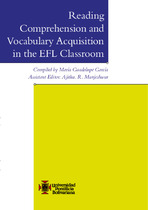| dc.contributor.author | Toro del, Zaily | |
| dc.date.accessioned | 2021-07-22T20:57:40Z | |
| dc.date.available | 2021-07-22T20:57:40Z | |
| dc.date.issued | 2020 | |
| dc.identifier.isbn | 978-958-764-887-4 (versión digital) | |
| dc.identifier.uri | http://hdl.handle.net/20.500.11912/8878 | |
| dc.description | 42 páginas | spa |
| dc.description.abstract | Este estudio se realizó con un grupo de niños principiantes bilingües de una escuela pública. En el grupo había 36 estudiantes; niños y niñas, cuyo promedio de edad era de 12 años. El principal objetivo de este estudio era observar las estrategias más comunes utilizadas por los estudiantes para aprender una palabra nueva en inglés. Los participantes involucrados en esta investigación aplicaron diferentes instrumentos para obtener la información, tales como; encuestas, entrevistas y observaciones de clases.
Las cuales arrojaron suficiente información para ser analizada. Los resultados indicaron que la mayoría de los estudiantes usaron estrategias para aprender vocabulario, aunque no sean conscientes acerca de este proceso.
Se pudo observar que ellos la mayoría del tiempo usaban repeticiones (orales o escritas) al momento de aprender una palabra. Un hallazgo muy importante obtenido en esta investigación fue descubrir que la mayoría de los estudiantes presentaron dificultades en el proceso de aprendizaje de una palabra, de hecho, una gran cantidad representativa de ellos no saben utilizar el diccionario. Una herramienta muy importante en el proceso de adquisición de vocabulario, es darle a conocer a los estudiantes, diferentes
estrategias para aprender vocabulario, las cuales son útiles para obtener un vocabulario rico y variado para tener éxitos en los resultados del proceso del aprendizaje de la lengua extranjera. | spa |
| dc.description.abstract | A beginner’s group of bilingual children from a public school were tested. The group consisted of 36 students both boys and girls and their average age was twelve years. The main objective of this study was to observe the most common strategies used by the children to learn new vocabularies in English.
Participants involved in this research applied different instruments to obtain information, such as; survey, interviews, and class observation, which provided with enough data to be analyzed. Results indicated that
most of the students used strategies to learn vocabulary even though they were not aware about this process. It could be observed that most of the time they used repetition method (oral or written) at the moment of learning a word. An important finding obtained from this research was that most of the students presented difficulties in the process of learning a word. Also a vast majority of them do not know how to use a dictionary.
A very important tool in the process of acquiring vocabulary is making students aware of the use of different strategies to learn vocabulary, which are useful to get a varied and rich vocabulary in order to have successful results in the foreign language learning process. | spa |
| dc.format.mimetype | application/pdf | |
| dc.language.iso | spa | |
| dc.publisher | Universidad Pontificia Bolivariana | spa |
| dc.rights | Attribution-NonCommercial-NoDerivatives 4.0 International | * |
| dc.rights.uri | http://creativecommons.org/licenses/by-nc-nd/4.0/ | * |
| dc.subject | Vocabulario básico -- Aprendizaje | spa |
| dc.subject | Vocabulario -- Contexto | spa |
| dc.subject | Memorización -- Estrategias | spa |
| dc.title | Vocabulary Learning Strategies In The Process Of Acquiring Vocabulary | spa |
| dc.title.alternative | Reading Comprehension and Vocabulary Acquisition in the EFL Classroom | spa |
| dc.type | bookPart | spa |
| dc.description.sectional | Medellín | spa |


